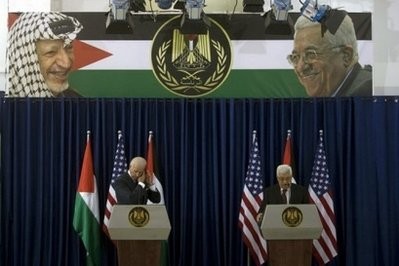Prospects for indirect Israeli-Palestinian talks lay in tatters after the Arab League came out against them unless Israel reversed its plans to build more settler homes in the occupied territories.
Israel found itself under increasing international pressure Wednesday over its decision to announce new Jewish settlements just as US Vice President Joe Biden was visiting Jerusalem to promote the talks.
Arab League chief Amr Mussa told reporters that Palestinian president Mahmud Abbas had told him he would not take part in talks under the current circumstances.
And a statement from the League overnight Wednesday said: "The Israeli measures must be stopped before any discussion on a resumption of talks, direct or indirect."

That statement followed an emergency meeting of ambassadors of the Arab League's 13 member states.
"Our position is clear," Mussa told reporters. "There cannot be talks, direct or indirect, if the recent Israeli decisions are not cancelled," referring to Tuesday's announcement on settlements by the interior ministry.
In Washington, US State Department spokesman Philip Crowley confirmed Wednesday that they had raised the issue with Israeli officials.
Crowley, who admitted it was unusual for them to condemn such a close ally as Israel, told reporters: "We are talking to the government and trying to understand what happened and why."
The news had already sparked a statement from Biden denouncing the move.
A White House statement confirmed he had showed up 90 minutes late for dinner at the Israeli Prime Minister Benjamin Netanyahu's residence Tuesday.
Biden had been hoping his visit to the Middle East would boost the chances of indirect talks. Instead he found himself dealing with the fall-out from Israel's decision.
Biden made his feelings clear again during a press conference Wednesday with Abbas in the West Bank city of Ramallah.
"As we move forward, the United States will hold both sides accountable for any statements or actions that inflame tensions or prejudice the outcome of talks as this decision did," he said.
"It is incumbent on all parties to grow an atmosphere of support for the negotiations and not to complicate them."
Abbas said Israel's announcement, and an earlier decision to build 112 new homes for settlers in the West Bank, "undermine trust and deal a severe blow to efforts deployed over the past months to start indirect negotiations."
The Palestinians see east Jerusalem as the capital of their promised state.
Israel, which seized east Jerusalem in the 1967 war and later annexed it in a move not recognised by the international community, considers the city its eternal and indivisible capital.
The European Union's foreign policy chief Catherine Ashton issued a statement Wednesday condemning the Israeli decision.Related article:Australia says new Israel settlement 'not helpful'
"The European Union reiterates that settlements are illegal under international law," it said, echoing a point made by United Nations Secretary General Ban Ki-moon a day earlier.
Several individual member states issued their own messages attacking the Israeli position.
"This is a bad decision at the wrong time," said British Foreign Secretary David Miliband.
"It will give strength to those who argue that Israel is not serious about peace."
In Washington meanwhile, State Department spokesman Crowley made it clear that the subject was not going to go away.
"We are in discussions with the Israelis about this announcement and I'm sure that it will come up when the senator is in the region next week," he said, referring to former senator George Mitchell, the US Middle East envoy.
Mitchell is to return to the region, having helped broker a deal to begin indirect Israeli-Palestinian talks on Monday, which would have been the first of any kind since Israel launched its war in Gaza in December 2008.
By Thursday however, that work seemed to be in ruins.
"The insult has reached a point that not a single Arab could accept," Mussa told reporters before the emergency Arab League meeting.
"Israel does not care about anybody, neither the mediator, nor the Palestinians."
























